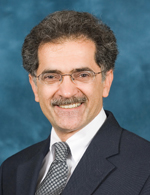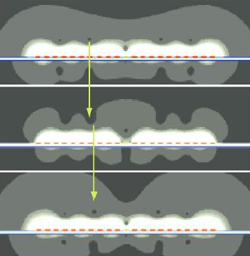Research Spotlight: 3-D electrical force fields manipulate microscale particles
The primary advance shown in this research as compared to earlier work is the successful use of a 3-D potential force field.

 Enlarge
Enlarge
Prof. Kamal Sarabandi and an interdisciplinary team at the University of Michigan are using electrical energy as a force field to manipulate microscale objects. According to the researchers, this research takes a “first step toward creating devices capable of positioning and orienting cells for tissue engineering lab experiments.”
While the activity, known as dielectrophoretic manipulation, is not new, the authors have developed novel approaches that make it possible to actually manipulate single cells, rather than move them around with relative imprecision. They then use dielectrophoresis (DEP) to manipulate collections of particles or cells of the same type, such as muscle fiber cells.

 Enlarge
Enlarge
The primary advance shown in this research as compared to earlier work is the successful use of a 3-D potential force field. This method was previously avoided due to the difficulties involved in both generating a 3-D force field, and then using it to control the object.
The technique has potential applications in “biochemical reactions, sample analysis and synthesis, molecular genetics, biotechnology production, development and testing, clinical diagnostics, cell manipulation, lab-on-chip, etc.”
The research is described in the paper, “Electric Field-Shaping Microdevices for Manipulation of Collections of Microscale Objects,” by Konstantinos Varsos, Jonathan Luntz, Michael Welsh, and Kamal Sarabandi. Proceedings of the IEEE, Vol. 99, No. 12, December 2011. Dr. Varsos (PhD ME 2006) is U-M Technology Innovation Thrust Area leader in the General Motors/University of Michigan Collaborative Research Lab. Dr. Luntz is an assistant research scientist in the Department of Mechanical Engineering, and Dr. Welsh is a professor in the department of Cell & Developmental Biology.

 MENU
MENU 
